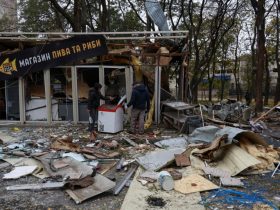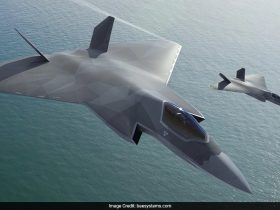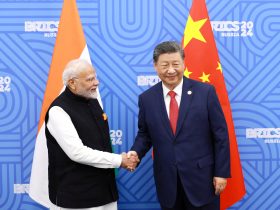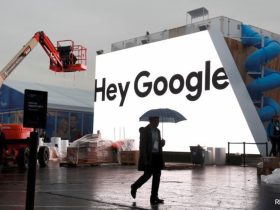Iran is keen to barter with the United Nations atomic watchdog over its compliance with safeguards on its nuclear programme however won’t achieve this “beneath strain and intimidation”, the nation’s prime diplomat says.
Iranian International Minister Abbas Araghchi met Worldwide Atomic Vitality Company (IAEA) chief Rafael Grossi in Tehran on Thursday, describing their interplay as “necessary and simple” in a submit on X.
Grossi advised Iranian officers that the UN watchdog needs to see “concrete, tangible and visual outcomes” throughout discussions on Iran’s nuclear programme.
After the assembly, Araghchi – who served as Iran’s chief negotiator within the talks that led to a 2015 nuclear cope with world powers – mentioned his nation “has by no means left the negotiation desk on its peaceable” nuclear programme.
“The ball is within the EU/E3 courtroom,” Araghchi wrote, referring to the UK, Germany and France.
Iran was “keen to barter based mostly on our nationwide curiosity & our inalienable rights, however NOT prepared to barter beneath strain and intimidation”, he posted on X.
In a joint information convention with Mohammad Eslami, the pinnacle of the Atomic Vitality Group of Iran, Grossi mentioned that given the “severe circumstances within the area”, he was decided to make the talks “profitable”.
The IAEA chief’s go to comes weeks earlier than United States President-elect Donald Trump takes workplace in January.
Throughout Trump’s earlier time period as president, the US unilaterally withdrew from the 2015 settlement that noticed Iran cut back its nuclear programme in alternate for a lifting of worldwide sanctions in opposition to its financial system.
Eslami mentioned he regarded ahead to “mutually constructive and efficient talks beneath the current circumstances”.
However he warned of “rapid countermeasures” in opposition to any decision by the IAEA’s board of governors that intervene with Iran’s nuclear programme.
Grossi mentioned, “The truth that worldwide tensions and regional tensions do exist – this exhibits that the area for negotiation and diplomacy is just not getting larger, it’s getting smaller.”
The IAEA chief can be anticipated to fulfill President Masoud Pezeshkian, who advised the UN Normal Meeting in September that he needs to open a “constructive” chapter in his nation’s worldwide relations and was “prepared to interact” with the West over Iran’s nuclear programme.
Earlier than his journey, Grossi had appealed to Iran’s leaders to take steps to resolve longstanding points along with his company, together with a push for extra monitoring cooperation at nuclear websites and an evidence of uranium traces discovered at alleged undeclared websites.
However little has come from his efforts and with the return of Trump, who’s extensively anticipated to revive a most strain coverage on Iran, Grossi’s journey ought to present indications of how Iran needs to proceed within the coming months.
Reporting from Tehran, Al Jazeera’s Resul Serdar mentioned that whereas quite a bit was at stake throughout Grossi’s go to, the potential for a breakthrough was “fairly low”.
“There are main sticking factors” between the 2 events, he mentioned, including that the “distrust” can be important.
Other than points about monitoring, the IAEA can be accusing Iran of denying UN nuclear inspectors accreditation, Serdar reported.
“In flip, Iran is accusing the IAEA of politicising the method and behaving like they’re performing on behalf of third events, notably on behalf of Israel,” he added. “As we speak we aren’t anticipating this distrust to be overcome.”
Iran’s work on uranium enrichment has been seen by the West as a disguised effort to develop nuclear weapons functionality. Tehran is now enriching uranium as much as 60 % fissile purity, near the roughly 90 % required for a nuclear bomb.
However Iran has lengthy denied any nuclear bomb ambitions, saying it’s enriching uranium for civilian power makes use of solely.
Grossi has mentioned that whereas Iran doesn’t presently have a nuclear weapon, it does have loads of enriched uranium that would finally be used to make one.







